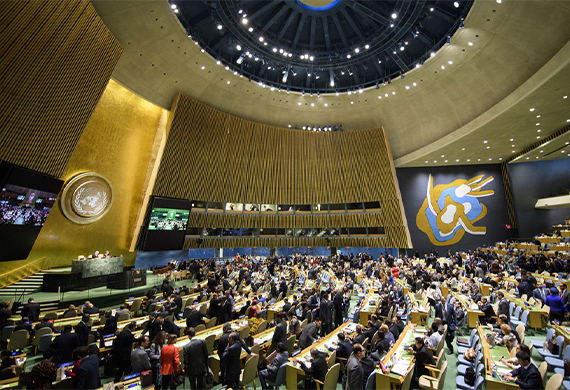
UN Report Highlights Insurmountable Barriers to Achieving Gender Equality by 2023
By: WE Staff | Friday, 8 September 2023
According to a report jointly released by UN Women and the UN Department of Economic and Social Affairs, deeply entrenched biases against women worldwide make achieving the UN's gender equality goal by 2030 an unattainable aspiration.
The report, titled "The Gender Snapshot 2023," paints a stark picture of global gender inequality, identifying biases that persist in health, education, employment, and political power structures as formidable obstacles. It highlights active resistance to gender equality, chronic underinvestment, unequal access to healthcare, and political underrepresentation as key factors hampering progress.
Despite advances in various areas, millions of girls, particularly in conflict zones, still lack access to quality education. Only 61.4% of women aged 25 to 54 are part of the labor force, compared to 90.6% of men. The gender pay gap remains pronounced, with women earning just 51 cents for every dollar earned by men in 2019.
Biases also limit women's roles in fields critical to the future, including science, technology, innovation, and artificial intelligence. Global political representation for women stands at a meager 26.7% in parliamentary seats, 35.5% in local government seats, and 28.2% in management positions.
The report underlines the escalating impact of conflicts and climate change on women and girls, with 614 million living in conflict-affected areas in 2022, a 50% increase from 2017.
While the UN's 17 goals for 2030 encompass various global challenges, the report warns that neglecting gender equality puts all these objectives in jeopardy. It criticizes inadequate and inconsistent funding for gender equality programs, noting that just 4% of total bilateral aid between 2020 and 2021 was allocated to these efforts, down from 5% in previous years.
To bridge the gender gap and achieve gender equality by 2030, an estimated $6.4 trillion is needed annually across 48 developing countries, covering nearly 70% of the developing world's population. The report's findings serve as a stark reminder of the urgency and global commitment required to dismantle deeply rooted gender biases.
Most Viewed
- 1 Women's Health Startup HerMD Closing Doors Amid Industry Challenges
- 2 5 Famous Women in Indian Armed Forces
- 3 Saudi Women No longer Require Male Permission for Clothing Choices, says Prince MbS
- 4 Kolkata Medtech Startup Innovodigm Raises Rs 5.5 Crore Seed Funding Led by IAN Group
- 5 Yamunanagar's Kashish Kalra Honoured after Securing 111th Rank in UPSC Civil Services Exam
- 6 Madurai Appoints Its First Woman Corporation Head
- 7 IAS Vijayalakshmi Bidari Appointed as the new Nagpur Divisional Commissioner
- 8 American Entrepreneur Lucy Guo Overtakes T Swift to become Youngest Female Billionaire
- 9 ICC Women's World Cup 2025 Trophy Showcased at Indore's Holkar Stadium
- 10 Aparna Saxena's Beauty Venture AntiNorm Launches in India
- 11 Vidya Nataraj Co-Founded BlueStone Jewellery & Lifestyle files IPO
- 12 5 Women Freedom Fighters of India
- 13 Dr. G Krishnapriya appointed as CEO for Trichy
- 14 M3M & Sirona Partner to Introduce Menstrual Hygiene Vending Machines in 15 Locations
- 15 Punjab Govt launches SHE Cohort 3.0 Supporting Tech-led Women Startups
- 16 Indian origin Lawyer, Sweena Pannu appointed as the US New Superior Court Judge
- 17 The Aurora Tech Award recognizes 4 Indian Women-led Startups
- 18 Kerala's Republic Day parade featured an all-female tableau
- 19 Manisha Kabbur Becomes Karnataka's First Woman International Karate Coach
- 20 Director K. S. Ravikumar's Daughter Maalica Ravikumar Launches Life Coaching Company 'Evergrowth Academy' for Women
- 21 Leezu's Raises Pre-Seed Funding to Accelerate Growth in Sexual Wellness Industry
- 22 Sattu: Super-easy summer drink for PCOS gut healing
- 23 Swathi Nelabhatla creates Sitha App, India's First Women-Exclusive Gig Platform
- 24 7 Timeless Female Kathak Dancers & their Iconic Legacies
- 25 Meet 7 Iconic Women Architects of Modern India & their Most Impactful Work
- 26 This Woman-led Insuretech Startup is Helping Bridge the Education Financing Gap in India
- 27 Women Leaders Share Lessons Learnt from India Women's WC Win
- 28 5 Enterprising Women Founders Powering Singapore's Tech & Innovation Landscape
- 29 4 Women. 4 Stories. One Vision for Smarter, Stronger Healthcare
- 30 Global Gender Gap Narrows to 68.8%, But Full Equality 123 Years Away: WEF Report 2025
- 31 Changemakers: 7 Women Entrepreneurs Taking the Make in India Movement Forward
- 32 Meet Lucy Guo, The Youngest Self-Made Female Billionaire Disrupting Tech
- 33 How Women are Driving India's Festive Online Shopping Surge






